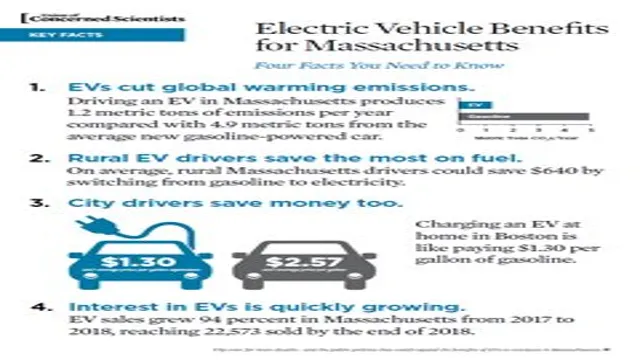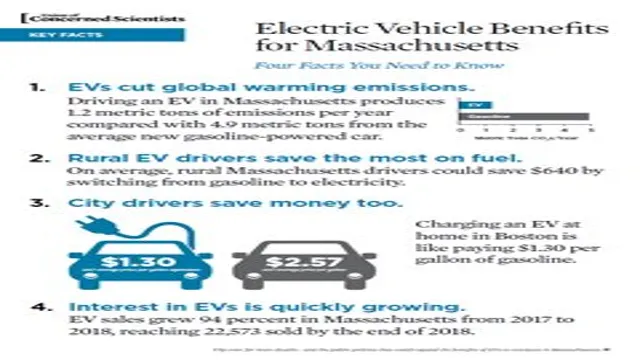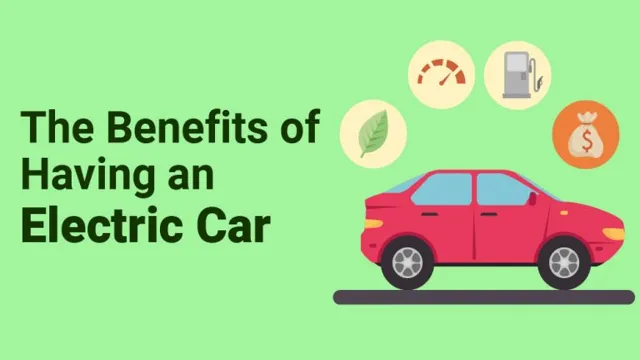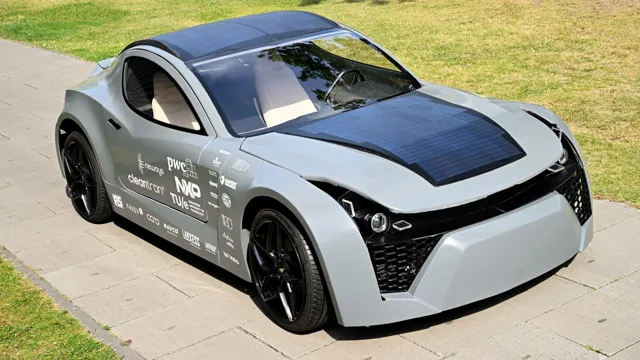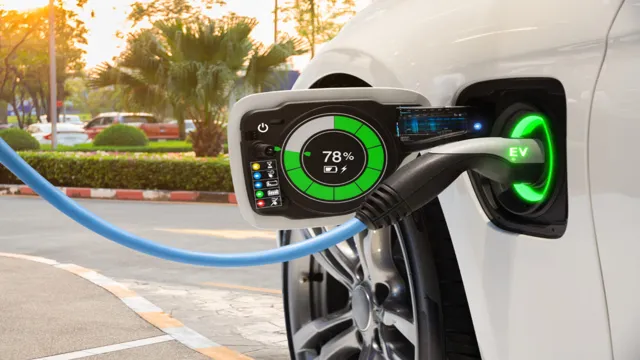Revolutionizing the road: Top 10 benefits of Electric Cars you just can’t ignore
Electric cars may have been considered a mere novelty a few years ago, but nowadays they are gaining significant popularity as an everyday mode of transportation. As more people become environmentally conscious, the shift towards these vehicles becomes stronger. Electric cars are not only cost-effective over time, but they are also multi-functional, practical, and suitable for all ages.
In this blog, we’ll take a deeper look at the benefits and advantages of electric cars, and examine why more people are making the switch to this “vehicle of the future”.
1. Environmental Benefits
Electric cars offer numerous environmental benefits. They emit zero emissions, making them ideal for the environment, and they can help reduce the amount of greenhouse gases that contribute to climate change. Additionally, electric cars are exceptionally energy-efficient, which means they can use less energy to travel the same distance compared to traditional cars.
By switching to electric cars, we can achieve a significant reduction in the total carbon footprint of transportation. Furthermore, electric cars rely on renewable energy, such as solar and wind power, which is much cleaner than burning fossil fuels. As a result, they also help to improve air quality and reduce pollution levels in cities.
Their impressive fuel efficiency and environmental benefits make them a convincing alternative to traditional gas-powered cars, and they are likely to become more common in the future.
Reduced Air Pollution and Emission
With the increase in global industrialization, air pollution has been a major concern for both environmentalists and policymakers. However, the advancements in technology and renewable energy resources have significantly contributed to reducing air pollution and emissions. Carbon dioxide, sulfur dioxide, and nitrogen oxides are some of the major greenhouse gases emitted by burning fossil fuels.
The deployment of cleaner energy sources like solar, wind, and hydro-power has reduced carbon emissions, while modern vehicles use advanced emission control technologies that reduce harmful exhaust fumes. These innovations have reduced the concentration of pollutants in the atmosphere, leading to cleaner air and a healthier environment. By moving away from traditional fossil fuels, we have dramatically reduced our carbon footprint and created a more sustainable world.
We must continue to prioritize reducing emissions and pollution to mitigate the negative impacts on the environment. With increased awareness and implementation of eco-friendly practices, we can create a brighter, cleaner future for all.

Reduced Dependence on Fossil Fuels
Reduced Dependence on Fossil Fuels Moving away from fossil fuels to alternative sources of energy is crucial for the future of our planet. The environmental benefits of this shift cannot be overstated. For starters, burning fossil fuels contributes heavily to greenhouse gas emissions, which are a major contributor to global warming.
By reducing our dependence on these fuels, we can drastically reduce our carbon footprint and help to slow the effects of climate change. Additionally, the extraction and transportation of fossil fuels can lead to significant damage to ecosystems, from oil spills to habitat destruction. By investing in renewable energy sources such as solar, wind, and hydropower, we can not only protect the environment but also promote sustainable economic growth.
Plus, renewable energy sources are often more reliable and cost-effective in the long run, which can ultimately benefit both consumers and businesses. Overall, reducing our dependence on fossil fuels is a critical step towards a cleaner, healthier, and more sustainable future for generations to come.
Reduced Noise Pollution
Reducing noise pollution can have several environmental benefits in the long run. Noise pollution is commonly caused by transportation, manufacturing, and construction activities and can have a significant impact on the health and well-being of both humans and wildlife. By reducing noise pollution, we can help to decrease stress levels, improve sleep quality, and reduce the risk of hearing loss in humans.
Additionally, it can help to decrease the stress levels of wildlife which is especially important in ecological sensitive areas where the natural habitats of animals can be negatively impacted. Furthermore, reduced noise pollution can help to decrease the amount of energy used during transportation, manufacturing, and construction activities which can help to lower greenhouse gas emissions and reduce the overall carbon footprint of these industries. Overall, there is a need for increased awareness and efforts to reduce noise pollution as it can have a significant impact on our environment and the health of living beings.
2. Economic Benefits
The benefits of electric cars go beyond just environmental sustainability; they also provide economic benefits. First, electric cars require less maintenance than traditional gas-powered cars, which means less money spent on routine oil changes and other maintenance services. This translates to long-term savings for car owners.
Second, electric cars are more energy efficient than gas-powered cars, which means less money spent on fuel. Third, governments are incentivizing the shift towards electric cars by offering tax credits, rebates, and other incentives, which further reduce the burden on car owners. Fourth, as more people switch to electric cars, the demand for oil decreases, which can result in lower oil prices and a more stable global economy.
Therefore, electric cars not only benefit individual car owners but also have wider economic benefits for the society as a whole.
Lower Operating Costs
When it comes to running a business, one of the most critical factors is keeping operating costs low while maintaining quality and efficiency. Implementing the right technological tools and processes can go a long way in reducing expenses. By utilizing software and automation, businesses can streamline their operations, reduce the need for manual labor, and eliminate errors caused by human input.
For instance, advanced analytics tools can provide valuable insights into a company’s operations across various departments, allowing leadership to identify areas where costs can be cut or eliminated. By implementing cloud-based systems and services, businesses can also reduce or eliminate the need for costly on-premise infrastructure and software, thereby lowering capital expenses. In this way, companies can achieve long-term cost savings while increasing productivity and overall efficiency.
By choosing the right tools and technologies, businesses can lower their operating costs while maintaining their competitive edge in the marketplace.
Reduced Maintenance Costs
Reduced maintenance costs are one of the most significant economic benefits of investing in modern technology. Business owners often find themselves spending huge amounts of money for maintenance and repairs of outdated equipment. Investing in modern technology such as automation systems, cloud computing and advanced machinery can help reduce maintenance costs significantly, as they are more reliable and less prone to breakdowns.
With the help of technology, businesses can save up on regular maintenance expenses and ultimately reduce the overall cost of operations. This not only helps increase profitability but also frees up resources, allowing businesses to focus on other important areas such as scaling operations and improving productivity. By embracing new technology, businesses can enjoy a more efficient, streamlined operation while drastically reducing their maintenance costs.
As a result, investing in modern technology is a wise economic decision that can result in substantial savings in the long run.
Tax Incentives and Credits
Tax incentives and credits can provide a variety of economic benefits for individuals and businesses alike. When these programs are properly utilized, they can result in significant savings and financial rewards. One of the most attractive benefits of tax incentives and credits is the reduction of tax liabilities.
This can be accomplished through deductions for qualified expenses or by claiming credits for certain activities or investments. For example, taxpayers may be able to claim credits for installing energy-efficient systems in homes or businesses, or for investing in renewable energy projects. In addition to reducing tax burdens, these incentives and credits can also stimulate economic growth by encouraging investment and job creation.
As a result, many governments offer a range of tax incentives and credits to encourage economic development and promote sustainability. By taking advantage of these programs, taxpayers can not only save money but also contribute to a more prosperous and sustainable future.
3. Social Benefits
Electric cars offer a wide range of benefits that go beyond just cost savings. One such benefit is the positive impact on the environment. By driving an electric car, you contribute to reducing carbon emissions, which is vital for creating a cleaner, healthier future for everyone.
Additionally, electric cars have much lower noise levels compared to traditional combustion engines, resulting in less noise pollution in urban areas. But perhaps one of the most significant benefits of electric cars is their impact on society. With reduced pollution levels and quieter roads, communities become more inviting and pleasant to live in.
As more people make the switch to electric cars, we can look forward to a cleaner, healthier, and more sustainable future. So, not only do electric cars offer individual benefits, but they also contribute to creating a better society overall.
Improved Public Health and Safety
One of the most significant benefits of improved public transportation infrastructure is the improvement in public health and safety. By reducing the number of vehicles on the road, public transit can help mitigate air pollution, which is a significant contributor to respiratory health issues. In addition, residents who rely on transit for commuting are more likely to get regular exercise and may enjoy better mental and physical health as a result.
Improved and timely accessibility to medical care is also important for the well-being of communities, and public transportation can make that possible. Moreover, investments in transportation infrastructure can support disaster preparedness and response, ensuring that communities can recover efficiently from natural disasters and emergencies. Overall, a robust and well-maintained public transportation system can have significant social benefits by improving public health and safety for all.
Reduced Traffic Congestion
Reduced traffic congestion has become one of the most significant social benefits of recent times. There are several reasons why traffic congestion has reduced; the major factor is COVID-19, which resulted in travel restrictions, social distancing, and remote work adoption. Due to these changes, many people are no longer commuting to work daily, reducing the number of cars on the road.
This has led to less congestion on the highways, less air pollution, and improved traffic flow. In addition, less traffic congestion means that people are spending less time sitting in traffic and can better manage their time by arriving at their destinations on time. This has led to increased productivity and reduced stress levels for many people.
Overall, reduced traffic congestion is an excellent social benefit that has positively impacted the environment, people, and the economy.
4. Performance Benefits
One of the most notable benefits of electric cars is their improved performance. Unlike traditional gasoline-powered vehicles that rely on an internal combustion engine, electric cars use an electric motor. This means that electric cars can deliver instant torque, resulting in quicker acceleration and a smoother driving experience.
Additionally, electric cars have a lower center of gravity due to the location of their battery packs, providing better handling and control. This improved performance not only makes driving more enjoyable but also adds to the overall safety of electric cars. Furthermore, electric cars have fewer moving parts, resulting in less maintenance and repair costs.
In summary, the benefits of electric cars aren’t limited to their positive environmental impact, but also include their superior performance and lower overall costs of ownership.
Conclusion
In conclusion, the benefits of electric cars are crystal clear – they emit zero emissions, save you money on fuel and maintenance, and they look pretty funky too. So why not join the wave of the future and hop on board an electric vehicle today? Who knows, you might just find yourself cruising around feeling like you’re in a sci-fi movie – and let’s be honest, who doesn’t love that feeling?”
FAQs
How do electric cars benefit the environment?
Electric cars produce zero emissions, which means they do not contribute to air pollution and help to reduce greenhouse gas emissions.
Do electric cars save money on fuel expenses?
Yes, electric cars are cheaper to operate compared to gasoline-powered vehicles. Charging an electric car is significantly cheaper than buying gasoline.
What are the maintenance benefits of electric cars?
Electric cars have fewer moving parts compared to traditional gasoline vehicles, which means they require less maintenance and repairs. Electric car drivers can save money on maintenance costs.
Do electric cars have tax benefits?
Yes, owning an electric car may result in tax credits and incentives, depending on your state and federal regulations. Some states offer tax credits for purchasing or leasing an electric car while the federal government offers a tax credit of up to $7,500 for electric car buyers.

